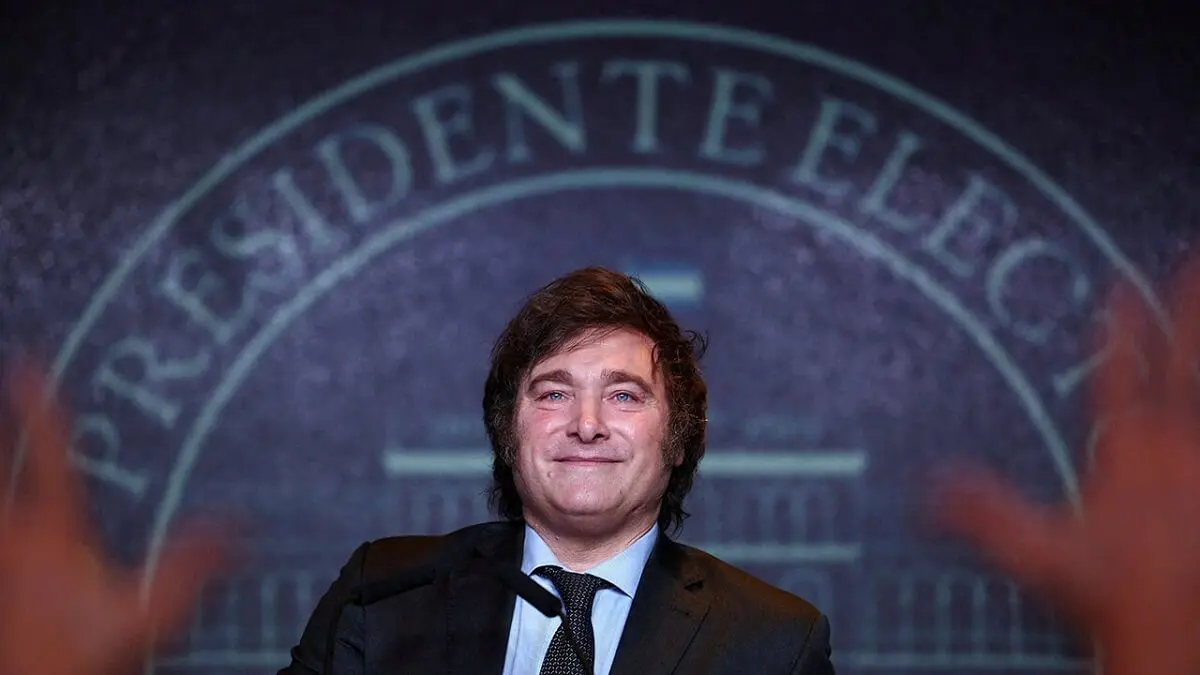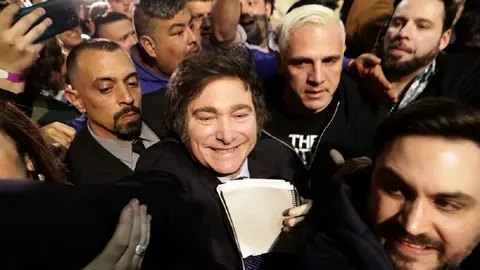Javier Milei's great challenge

Javier Milei's difference with the Peronist candidates was much greater than expected, but the new Argentine president will not have a majority in Parliament, which could pose a serious obstacle to his objectives. Juan Ignacio di Meglio, Director of Public Affairs at Llorente y Cuenca Argentina, took to the microphones of Onda Madrid's "De cara al mundo" to offer the keys to the new Argentinean scenario.
Mr Di Meglio, is the miracle promised by Javier Milei, the new president of Argentina, possible?
There is an Argentinean context of an economic and social crisis such as we have never seen in recent years. He comes to the presidency after elections in which he manages to position himself as the third way between Juntos por el Cambio (Together for Change) and the ruling party. A very worn-out ruling party, with a great economic crisis where the candidate was the same, the Minister of Economy, with inflation at 140%, with poverty at 45% of the population and with anger and apathy of the population towards politics, where Javier Milei there, very skilfully, manages to condense this anger and apathy into the famous "angry vote" that we teach, which is basically an anti-political caste vote, as he says, and which is a vote against politics and a rejection of the political leadership, which fails to respond to a citizenry that really needs a response.
In this sense, we do not know how Javier Milei's possible government will develop. What we are seeing are some signs of moderation. We believe that this is a good sign, not only for Argentines, but also for international markets. On the other hand, Juntos por el Cambio, Patricia Bullrich, who was his presidential contender as Security Minister, and in the economic team, people who answer to Mauricio Macri, the former president. This suggests that some of the ideas he wants to take forward, such as licensing, could go much further.
If Mr. Macri, whom you mentioned, could not, why should Mr. Milei be able to? Because beyond the eccentricities, right now the show is over and reality begins, and Argentines are going to demand results sooner rather than later.
If we draw a parallel between the government of Mauricio Macri, from 2015 to 2019, and the government of Javier Milei, which is starting now, in reality Milei not only assumes a much more delicate situation, from an economic point of view, than Mauricio Macri, not only because of high inflation, but also because of the low reserves of the Central Bank. We are estimating mixed, negative reserves of around 13 billion dollars in Argentina, with a large mass of crime.

As you mentioned, he does not have a majority in Parliament, which means that getting his laws and his work through is going to be complicated. And, furthermore, will Kirchnerism resist as long as it can to lose its privileged positions?
It is going to be a complex situation, not only politically, but also socially. Argentina is living in an economic fragility that will mean that any measure taken by Javier Milei, which is not popular in terms of the income of Argentines, will necessarily be resisted, not only by social organisations and the opposition, but also by the people in the street. Many of the people who voted for him are betting on an improvement in their pockets and on the fact that, in Javier Milei's terms, this adjustment will be paid for by the political caste and not by the people. When we analyse how much the fiscal deficit could be reduced, which is Argentina's biggest problem, by reducing political spending, it is really very minor, it will be symbolic, but the big adjustment in spending will have to be made in areas that will necessarily have an impact on people's pockets, such as tariffs and subsidies. There are people who do not have a system of subsidies on utility rates. There is a system of public subsidies that generates an enormous deficit for the treasury.
The issue of derogations in public works, which Milei has already announced will generate all public works, will not only affect public works workers, but also the entire ecosystem that this entails. When he starts to touch on certain issues, public spending, he has to be very careful, and he really doesn't understand that a large part of the 56% who voted for him is not 56% convinced of what he is proposing, but rather a vote against him. When people ask him if he agrees with, for example, privatising public education, the majority of people say no. So, I think there is going to be a lot of opposition. So I think there is going to be a big gap between what was a programmatic vote, which is much smaller than the 56%, and a large part of those people who vote for him because they are fed up with years of economic stagnation.
As for relations with Spain, Spanish companies have many interests in Argentina. I remember that they were the only ones that stayed in Argentina during the 2000-2001 crash. Politically, the Spanish President of the Government has disqualified Mr. Milei. Mr Milei invited the leader of Vox, Santiago Abascal, to his inauguration. To what extent can political issues affect economic and business issues in relations between Spain and Argentina, or must normality and common sense prevail in the end between the two parties?
The great unknown of Milei's government will be its international policy and Argentina's relations with the world. If one analyses what Javier Milei said in his campaign, one would have to think that the foreign policy of "freedom to move forward" will have much more to do with a very fluid relationship with the United States and Israel, as opposed to other economies such as China and Brazil, which are two extremely important trading partners for Argentina. When we talk about Spain... I don't understand the Mercosur-European Union agreement, which has yet to be ratified by Congress. Milei always spoke of Mercosur as a burden, he says, that is not useful, in his own words, "for absolutely nothing in the region".
He points more to the idea of creating free trade agreements with certain countries. I think there is going to be an issue here, and we will have to see in the coming days whether in the end these expressions were just a campaign wish and a populist slogan, or whether Javier Milei really decides to cut relations with countries such as China or Brazil, which would be really crazy in terms of international relations, and also to set aside a European Union-Mercosur agreement, which took many years of management during the government of Mauricio Macri, and which I believe would be very beneficial for the Government of the Republic, as well as for Argentine companies, as in this case Spanish companies.
What we are seeing is that there has been a moderation, not only in the economic and social proposals that Milei is putting forward, but also in some gestures, for example, responding to a letter from Xi Jinping in a very cordial manner, having some kind of conversation with the Brazilian government, although later the contact with Bolsonaro also tarnished that a little. Javier Milei, who takes office on 10 December, is a very well-educated person and we hope that the Argentine government will really make a decision this year with an economic process for the country, where we are not really going to have to lose all possible markets. We will see how it develops and we will be very attentive. It is also true that the government here in Spain is a rather peculiar and particular government.









